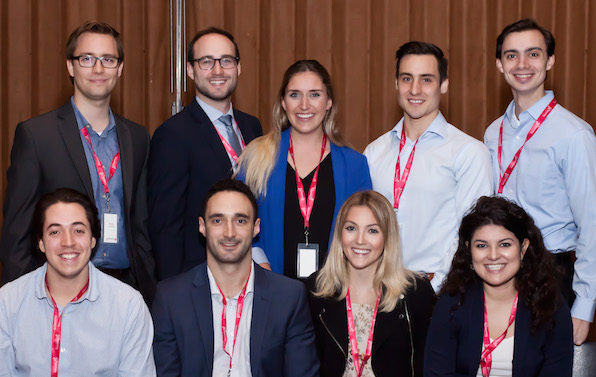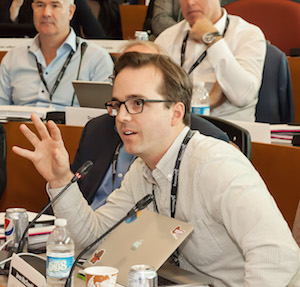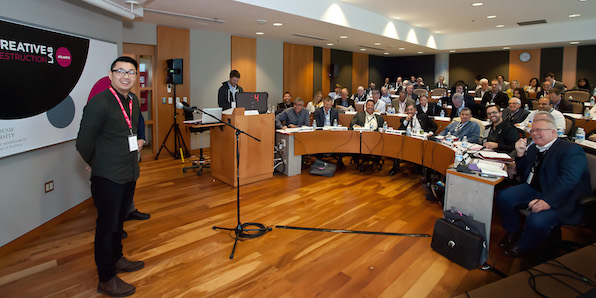
Top L-R: Brian Abelseth, Patrick Brousseau, Lauren Murray, David Hatcher, Nicholas Thompson
Bottom L-R: Ryan Bunker, David Lanteigne, Melissa Oglivie, Priyanka Kochhar
In partnership with Dalhousie University’s Rowe School of Business, Creative Destruction Lab Atlantic offers MBAs a chance to gain real-world exposure to fast-growing and high-potential startups.
And for David Hatcher, who completed his MBA in April 2018, the elective even led to a full-time job.
One of 18 second-years to take advantage of the school’s inaugural offering following CDL’s December 2017 launch of an Atlantic branch, Hatcher says he got involved because he wanted to work in the “technology startup ecosystem”.
Hatcher wasn’t disappointed, soon finding himself face to face with a fellowship of CDL-Atlantic mentors and national business leaders that include John Risley, a telecom tycoon and president of Clearwater Fine Foods, and school benefactor Kenneth Rowe, founder and executive chair of IMP Group International. (Both businesses are based in Halifax, Nova Scotia.)
Energy startup
On the startup side, Hatcher worked with Jaza Energy, a technology firm bringing solar energy to off-grid African communities. He says he was able to add plenty of value to Jaza by leveraging his MBA learning, as well as the experience he gained during an earlier eight-month corporate residency with dual-listed kids’ entertainment giant DHX Media.
Says Hatcher, “I got to offer insights on industry verticals the company could enter, as well as information about internal corporate strategy, tracking employee performance and potential investors. And I also helped create investor marketing materials.”
Knowledge sharing
Hatcher says he and his cohort learned from each other’s experiences with CDL-Atlantic, and that this knowledge made its way into their classroom sessions – “ultimately helping all of us see what was happening throughout the entire CDL-Atlantic program.”
The program also taught Hatcher the degree to which startups are forced to deal with “a lot of strategic ambiguity and urgency” compared to mature businesses, while making “a relatively greater number of crucial decisions every day.”
Says Hatcher, “That’s everything from who to hire for key positions and how to develop key relationships with suppliers, customers and advisors – to which vertical to launch in”.
Job success
 Among the business leaders Hatcher met was serial entrepreneur Jevon MacDonald (pictured right), who co-founded Halifax incubator Volta Labs and has built companies in Halifax, Toronto, Texas and Silicon Valley. The two hit it off, and Hatcher is now working at Internet-focused startup Manifold.co, a MacDonald venture.
Among the business leaders Hatcher met was serial entrepreneur Jevon MacDonald (pictured right), who co-founded Halifax incubator Volta Labs and has built companies in Halifax, Toronto, Texas and Silicon Valley. The two hit it off, and Hatcher is now working at Internet-focused startup Manifold.co, a MacDonald venture.
Newfoundland, too
Student Paul Best spent the winter term working remotely with Seaformatics Systems, a startup in St. John’s that allows people to charge phones and other devices with wind and water energy.
Best, who began his first business at age nine, says he’s always been very interested in entrepreneurship and startup culture – and that CDL-Atlantic helped him better understand the pressures startups work under.
After graduation, he went straight into a brand manager role in Toronto for U.S. sports marketing agency Wasserman. He says that spending time with Rowe and the other mentors helped him figure out what investors are looking for in a startup – as well as “the best ways to move forward in the face of different problems.”
In the office
Student Priyanka Kochhar, meanwhile, worked with two startups during the winter semester, one being Halifax-based Harbr, a company that increases project transparency for retailers and real-estate developers.
Working out of Harbr’s offices weekly, alongside the company’s VP Marketing and its COO, Kochhar “got to do a lot more, and have many different roles,” compared with both her pre-MBA job with a large company, and her own eight-month-long corporate residency with Scotiabank, in Toronto.
Kochhar, who’s set to take up an oil & gas–related role in Texas for Scotiabank, says Harbr’s leadership made her feel “really valued”, while its collegial and non-hierarchical nature allowed her a chance to work in any capacity, “with a lot of space to move around, instead of being compartmentalized.”
Fast-growing program
The Rowe School of Business serves as the hub for the Atlantic offshoot of CDL, which Rotman School of Management started in 2012 as a seed-stage program for scalable technology and science-based startups.
CDL has expanded also to Vancouver, Calgary, Montreal and New York, while CDL companies have generated more than $1 billion in equity value. Beyond Atlantic Canada, past and present CDL mentors include the founders of WIND Mobile, Kik and Kobo, as well as companies bought by Microsoft and Amazon.
Besides benefitting from the students’ brains, CDL plugs startups into support from faculty experts across the universities. In Dal’s case, these experts include science and engineering professors.
Dal’s version also plugs students into a powerful network of accomplished entrepreneurs and investors. In addition to Rowe, Risley and MacDonald, CDL-Atlantic mentors include Chris Huskilson, the former CEO of $4 billion energy group Emera; Clarke Inc. executive chairman George Armoyan; Numus Financial CEO Wade Dawe; automotive sales king and former president and CEO of Newcap Radio Rob Steele; and former CEO and president of Lawtons Drugs Rob Sobey.
Specialty stream that plays to Dal’s strengths
As well as a general stream, CDL-Atlantic has a specialty stream for ocean agri-food and clean technology companies – playing to Dal’s strengths in these sectors and its close relationships with the on-campus Ocean Frontier Institute, and the nearby Centre for Ocean Ventures and Entrepreneurship.
Find out more
For more information on CDL, or if you have a venture and would like to apply to be a part of the program, visit www.creativedestructionlab.com

Dave Kim of Harbr
Recent News
- Two Bachelor of Commerce graduates on the importance of extra‑curricular activities and people skills
- Knowing her worth: Kayler Mutyabule
- Patrick Law: Pivoting cross‑country
- Building on passion: Francesca Hawkes
- Taking it further: Rebecca Osamudiame
- Isioma Oye‑Onwuka: A student profile
- Q&A with Dana Kabat‑Farr
- Himanshu Kumar: A student profile
